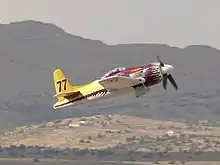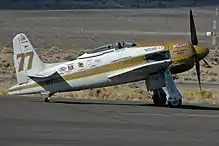Rare Bear
Rare Bear is a highly modified Grumman F8F Bearcat that saw major success at the Reno Air Races over multiple decades.
_Rare_Bear_2014_Reno_Air_Races.jpg.webp)
| Rare Bear | |
|---|---|
_Rare_Bear_2014_Reno_Air_Races_Gold_Final_by_D_Ramey_Logan.jpg.webp) | |
| 77 F8F-2 Bearcat (N-777L) Rare Bear 2014 Reno Air Races Gold Final Race start | |
| Type | Grumman Bearcat |
| Construction number | 122629 |
| Manufactured | 1946 |
| Registration | N777L |
| First flight | 13 September 1969 |
| Status | Operational |
History
The Bearcat that became Rare Bear was a severely damaged wreck when discovered by Lyle Shelton in 1969. It had been abandoned next to a runway on Porter County Regional Airport in Valparaiso, Indiana after it crashed there from a throttle-on torque roll in 1962. The airplane had been stripped by parts hunters, so Shelton found a fuselage, wing center section, landing gear and a right wing panel, but little else. Shelton bought the wreck and had the pieces trucked to Orange County, California and restoration began.[1] One of the major modifications made during the rebuild involved installing a more powerful Wright R-3350 (from a Douglas Skyraider) in place of the Pratt & Whitney R-2800 engine that is standard for a Bearcat. A Douglas DC-7 propeller and cowl were used and Shelton bought the landing gear fairings and doors from the wreck of Bob Kucera's Bearcat. Bill Fornoff loaned him a left wing panel and Gunter Balz supplied a rudder. The windshield and canopy were supplied by Edward T. Maloney.[2] The rebuild was finished with the first flight on 13 September 1969.[3]
Racing career


Just a week after its first flight, the Bearcat appeared in its first national championship Reno Air Race, sporting the name "Able Cat", where it finished a respectable 5th in the Unlimited Class, despite the lack of preparatory and flight test time. From 1969 to 1975, Lyle Shelton raced the aircraft (named "Phoenix I" from 1971 on) every year at the Reno Air Races, as well as air races in Mojave, California, San Diego, California, Miami, Florida and Cape May, New Jersey. In this period, he scored five victories.[4] During the 1976 air race in Mojave California, Shelton experienced an engine failure and had to perform a belly landing.[5]
The aircraft was not raced again until 1980, when it was renamed "Rare Bear". From 1980 until present day, Rare Bear has scored eleven more victories in the Unlimited Class.[4] A three-blade propeller, consisting of blades from a Lockheed P-3 Orion propeller, in a Lockheed Constellation hub, was fitted to the aircraft in 1988.[6] After back-to-back testing in 2004, a switch was made back to the Aeroproducts four-bladed propeller.[7]
In late 2006 both the plane and the team were sold to Rod Lewis for just under $2 million.[8] Recent accomplishments include finishing the Reno Air Races in 2004 and 2005 with the gold medal in the unlimited gold race. The pilot for those two championships was John Penney. In 2006 the Rare Bear was piloted by Ron Buccarelli.
For the 2007 Reno Air Races, Rare Bear appeared in a new paint scheme (burgundy fuselage, white wings, gold tail).[9] It was piloted by John Penney, who flew it to victory in the Unlimited Class Gold Race.
In the 2008 Reno Air Races, Rare Bear appeared in yet another new paint scheme.[10] Propeller problems during qualifying resulted in an intense all-night rebuild of the propeller. The aircraft was able to qualify and John Penney made it to the Unlimited Breitling Gold race. A landing gear problem during the qualifying heat race caused the engine to overheat. Several high-G pulls allowed the gear to extend, but the engine damage was done. The race crew said from their box in the stands that it was a matter of time before the engine let go. He was in second place when he was forced to call mayday once again during the Gold race, this time trailing smoke. While Penney made it down safely, it was then unknown how much damage had been done to Rare Bear.[11]
Before the 2009 races, the wing root mounted oil coolers were replaced with a boil-off oil cooling system. As a result, the outer halves of both wing root inlets were closed off.[12] Sporting yet another new paint scheme,[13] Rare Bear finished second in the final race with a speed of 479.088 mph (770.8 km/h).
In the 2010 races, Rare Bear finished second in the Gold Heat 3A at 447.755 mph (720.6 km/h). The Gold Final race was cancelled due to weather conditions.
The aircraft hasn't raced since coming second in 2015, but was on static display at the 2016 and 2017 events.
Records
Rare Bear has set many performance records for piston-driven aircraft, including the 3 km World Speed Record of 528.33 mph (850.26 km/h) set August 21, 1989, which still stands in this class, and a new time-to-climb record (3,000 meters in 91.9 seconds set in 1972 (9842.4 ft – 6,426 fpm), breaking a 1946 record set in a stock Bearcat.[14][15][16][17]
See also
References
- Rourk, Dell (September 2, 2008). Racing for the Gold: The Story of Lyle Shelton and the Rare Bear. AuthorHouse.
- Kinert, Reed, Racing Planes and Air Races; 1970 Annual, Aero Publishers, Inc., Fallbrook California, 1970.
- "Air Racing Rare Bear Unlimited Air Racer History of Air Racing". www.rarebear.com. Archived from the original on November 29, 2011.
- "Aircraft - Rare Bear". www.rarebear.com. Archived from the original on November 8, 2018.
- Carter, Dusty, Racing Planes and Air Races 1977/78 Bennial Fallbrook, California: Aero Publishers, 1978. ISBN 0-8168-7870-6.
- "Dead and gone to Heaven". www.supercoolprops.com. Retrieved 24 September 2011.
- "Air Race and Aviation News Rare Bear Gets Four Blader". www.aafo.com. Retrieved 24 September 2011.
- "The Bear Is Back". Smithsonian Air & Space Magazine.
- Picture of the Grumman F8F-2 Bearcat (G-58) aircraft Retrieved 24 September 2011.
- Picture of the Grumman F8F-2 Bearcat (G-58) aircraft Retrieved 24 September 2011.
- www.rgj.com—2008 Reno Air Race report
- "Air Racing Rare Bear - Unlimited Air Racer History of Air Racing". www.rarebear.com. Archived from the original on April 13, 2018. Retrieved 24 September 2011.
- "Aviation Photo #1583585: Grumman F8F-2 Bearcat (G-58)". Airliners.net. Retrieved 24 September 2011.
- "Air Racing Rare Bear Unlimited Air Racer History of Air Racing". rarebear.com. Archived from the original on February 26, 2011.
- Note that Shelton's claim to be the "fastest propeller-driven aircraft in the world" does not acknowledge faster turboprop aircraft such as the Russian Tupolev Tu-95 Bear bomber. Other sources credit "Rare Bear" as the fastest piston-driven aircraft.
- "Ask Us - Aircraft Speed Records". www.aerospaceweb.org.
- "Speed records from archives". Society of Air Racing Historians.